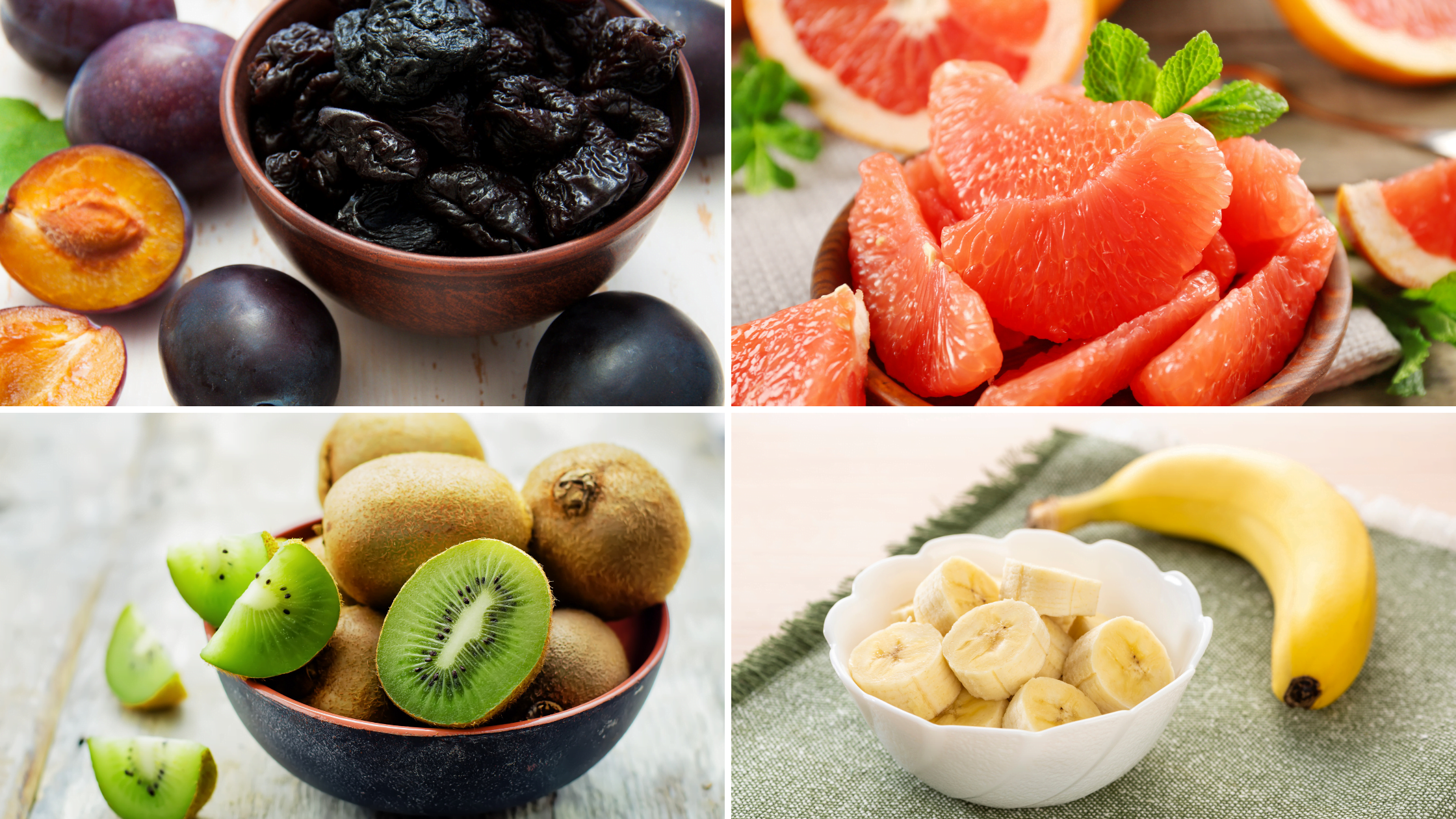Even eating just one more fruit a day could improve your bone health, says research.
Could eating fruit actually help prevent bone fractures or even osteoporosis? Science says, yes. Whether you want to prevent the loss of your bone health or struggle with low bone density, eating fruit might help. Better yet, evidence suggests you add fruit to your bone-healthy holistic lifestyle.
A Holistic Nutritionist Guide to Bone Health
- Whole Food Focused Eating Plan
- Prioritizing Sleep
- Stress Management
- Daily Physical Activity
- Exposure to Sunlight/Vitamin D Intake
How Much Fruit Do I Need to Eat for Bone Health?
Eating one more serving of fruit or vegetable a day can decrease your risk of fractures, reported a review of over 1100 studies. If you eat less than one serving of fruits and vegetables, your risk of hip fracture is 39% higher, than if you eat more than 3, evidence shows. But, regular intake of fruits and vegetables is key for healthy bone mineral density, according to the Framingham Osteoporosis Study,
3 Ways Fruit Improves Bone Health
Growing evidence supports that fruits play a role in bone health. Here are 3 ways scientists think fruits help your bones:
- Antioxidants
Fruits and vegetables contain nutrients with antioxidant properties, which means they can help reduce oxidation in the body. Low antioxidant intake can hinder the important process of bone remodeling.
- Alkaline
When you include fruits and vegetables in your diet, there’s a mild alkalization effect – it allows more calcium to be reabsorbed from the renal tubes, helping to reduce bone loss.
- Anti-inflammatory
A link exists between fruit and vegetable intake and chronic inflammatory conditions. Eating fruits may support bone health by reducing inflammation – a state associated with an increased risk of fractures and osteoporosis.
Can Fruit Improve Low Bone Density?
Low bone mineral density increases your risk of fractures but, it’s going tibia okay! Simple holistic lifestyle and food choices, including fruits, can improve your bone density.
10 Fruits for Bone Health
Many fruits contain bone-healthy nutrients:
- Prunes
- Bananas
- Raspberries
- Strawberries
- Oranges
- Kiwis
- Peaches
- Apples
- Papaya
- Grapefruit
Best Fruit for Bones: Prunes
Prunes might be one of the best fruits to eat for bone health. Prunes contain nutrients that may prevent bones from weakening and perhaps make them stronger. In a clinical study, eating prunes for 6 months helped 100 older postmenopausal women prevent bone loss. Impressively, five years later, the women who ate the prunes retained better bone mineral density than the group who didn’t. As for men, they also get bone-benefiting effects from eating prunes, suggests research.
How Many Prunes Do You Need to Eat to Improve Your Bone Health?
Previous research suggested 10 prunes a day would improve bone density. That’s a daunting amount of prunes! Luckily, as evidence grows, it appears eating just a handful of prunes can be as effective at improving bone health. Eating 4-5 prunes (50g) seems to do the trick.
5 Bone-Supporting Nutrients Found in Some Fruits
Many nutrients in fruits are known to have bone-supporting benefits:
- Boron has abilities to strengthen bones and stimulate growth.
- Magnesium-rich fruits are linked with greater bone mineral density in men, say researchers.
- Potassium, a mineral, has been linked to better bone mineral density in studies.
- Vitamin C plays a role in collagen formation which is important in bone health.
- Calcium is a well-known contributor to bone health, throughout life.
Of note, vitamin D and vitamin K2, as well as protein, fats, and carbohydrates also play a role in healthy bone metabolism. A well-balanced diet supports bone health – a Holistic Nutritionist can help you create an eating plan that works for you.
Bon(e) appétit!
References:
Comparative effects of dried plum and dried apple on bone in postmenopausal women. Br J Nutr 2011 Sep;106(6):923-30.
The short-term effect of prunes in improving bone in men. Nutrients 2022 Jan;14(2):276.
Bone-protective effects of dried plum in postmenopausal women: efficacy and possible mechanisms. Nutrients 2017 May;9(5):496.
Pivotal role of boron supplementation on bone health: a narrative review. J Trace Elem Med Biol 2020 Dec;62:126577.
Potassium, magnesium, and fruit and vegetables intakes are associated with greater bone mineral density in elderly men and women. Am J Clin Nutr 1999 Apr;69(4):727-36.
Fruit and vegetable intake and bones: a systematic review and meta-analysis. PLoS One 2019 May 31; 14(5): e0217223.
Bone mineral density and dietary patterns in older adults: the Framingham Osteoporosis Study. Am J Clin Nutrition 2002; 76(1): 245-52.
Effect of Fruit and Vegetable Intake on Oxidative Stress and Dyslipidemia Markers in Human and Animal Models In: Rasooli. Phytochemicals: Bioactivity and Impact on Health, 2011.
Inflammation as a contributing factor among postmenopausal Saudi women with osteoporosis. Medicine (Baltimore) 2017; 96(4): e5780.
The association of potassium intake with bone mineral density and the prevalence of osteoporosis among older Korean adults. Nutr Res Pract 2020 Feb; 14(1): 55-61.
The impact of diet and physical activity on bone health in adolescents. Front Endocrinol 2021 Sept 13; 12.
Efficacy of vitamin C supplementation on collagen synthesis and oxidative stress after musculoskeletal injuries: a systematic review.
